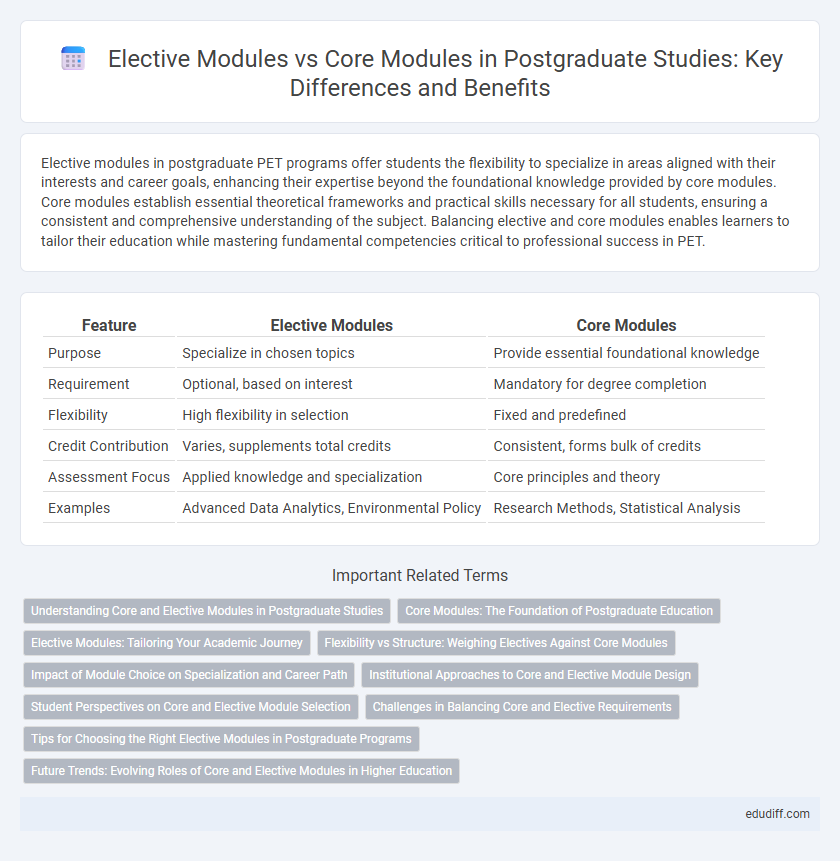Elective modules in postgraduate PET programs offer students the flexibility to specialize in areas aligned with their interests and career goals, enhancing their expertise beyond the foundational knowledge provided by core modules. Core modules establish essential theoretical frameworks and practical skills necessary for all students, ensuring a consistent and comprehensive understanding of the subject. Balancing elective and core modules enables learners to tailor their education while mastering fundamental competencies critical to professional success in PET.
Table of Comparison
| Feature | Elective Modules | Core Modules |
|---|---|---|
| Purpose | Specialize in chosen topics | Provide essential foundational knowledge |
| Requirement | Optional, based on interest | Mandatory for degree completion |
| Flexibility | High flexibility in selection | Fixed and predefined |
| Credit Contribution | Varies, supplements total credits | Consistent, forms bulk of credits |
| Assessment Focus | Applied knowledge and specialization | Core principles and theory |
| Examples | Advanced Data Analytics, Environmental Policy | Research Methods, Statistical Analysis |
Understanding Core and Elective Modules in Postgraduate Studies
Core modules in postgraduate studies provide essential knowledge and foundational skills critical for advanced academic and professional development, forming the mandatory curriculum requirements. Elective modules offer flexibility by allowing students to specialize or broaden their expertise according to personal interests and career goals, enhancing the overall learning experience. Understanding the distinction between core and elective modules helps postgraduate students strategically plan their study pathway for comprehensive skill acquisition and subject mastery.
Core Modules: The Foundation of Postgraduate Education
Core modules form the essential foundation of postgraduate education, providing comprehensive knowledge and advanced skills critical for academic and professional success. These modules ensure a structured learning pathway, emphasizing fundamental theories, research methodologies, and discipline-specific expertise. Mastery of core modules equips students with the analytical tools necessary for specialization and effective application in complex real-world scenarios.
Elective Modules: Tailoring Your Academic Journey
Elective modules offer postgraduate students the flexibility to tailor their academic journey by selecting courses that align with their specific interests and career goals, enhancing their expertise beyond core requirements. These modules foster interdisciplinary learning and allow for the development of specialized skills, which can increase employability and academic enrichment. Choosing elective modules strategically enables students to adapt their education to emerging industry trends and personal aspirations, promoting a personalized and versatile postgraduate experience.
Flexibility vs Structure: Weighing Electives Against Core Modules
Elective modules offer postgraduate students flexibility to tailor their learning according to personal interests or career goals, enriching specialization and interdisciplinary knowledge. Core modules provide essential structure, ensuring all students acquire fundamental skills and foundational theories vital for advanced expertise. Balancing electives against core modules enables a customized yet comprehensive educational experience, optimizing both depth and breadth in postgraduate studies.
Impact of Module Choice on Specialization and Career Path
Elective modules allow postgraduate students to tailor their specialization by focusing on niche subjects within their field, enhancing expertise and aligning their academic profile with specific career goals. Core modules provide foundational knowledge essential for all students, ensuring a comprehensive understanding that supports advanced study and professional qualifications. Choosing the right balance between core and elective modules significantly influences career trajectories by equipping students with both broad skills and specialized competencies valued by employers in targeted industries.
Institutional Approaches to Core and Elective Module Design
Institutional approaches to core and elective module design in postgraduate programs emphasize balancing foundational knowledge with specialized expertise, tailoring curriculum frameworks to both academic standards and student choice. Core modules are typically designed to ensure comprehensive mastery of essential concepts, forming the backbone of degree requirements, while elective modules offer flexibility for interdisciplinary exploration and skill diversification based on emerging industry trends. This strategic differentiation supports academic rigor and personalized learning paths, enhancing graduate employability and research competencies.
Student Perspectives on Core and Elective Module Selection
Postgraduate students often view core modules as foundational, ensuring essential knowledge and skills for their specialization, while elective modules offer opportunities for customization and exploration of personal interests. Selection preferences tend to prioritize core modules for academic progression and degree completion, whereas elective choices reflect students' desire to diversify expertise or align studies with career goals. Balancing these modules impacts student satisfaction, engagement, and perceived relevance of their postgraduate education.
Challenges in Balancing Core and Elective Requirements
Balancing core and elective modules in postgraduate studies presents challenges such as managing workload distribution while meeting compulsory learning outcomes. Students often struggle to allocate sufficient time to core modules that ensure foundational knowledge, while elective modules demand exploration of specialized interests. This balance requires strategic planning to optimize academic performance and skill diversification.
Tips for Choosing the Right Elective Modules in Postgraduate Programs
When selecting elective modules in postgraduate programs, prioritize courses that align with your career goals and complement your core knowledge to enhance specialization and employability. Consider the module's relevance to current industry trends and the expertise of the faculty to maximize learning outcomes. Balance challenging electives with your workload capacity to maintain academic performance and avoid burnout.
Future Trends: Evolving Roles of Core and Elective Modules in Higher Education
Core modules in postgraduate programs establish foundational knowledge essential for mastering specialized fields, while elective modules offer flexibility to explore emerging topics and interdisciplinary skills. Future trends suggest a growing integration of adaptive learning technologies to personalize core content, whereas elective modules will increasingly emphasize cutting-edge subjects like artificial intelligence, data analytics, and sustainability. This evolving structure aims to balance standardized expertise with innovative competencies, preparing graduates for dynamic career landscapes.
Elective Modules vs Core Modules Infographic

 edudiff.com
edudiff.com